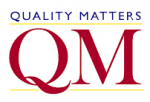
Quality Matters (QM) is a comprehensive quality assurance program used to evaluate and improve the design of online courses. If you are an instructor tasked with creating engaging, effective online courses, you may have heard of QM. Have you ever wondered if you should consider using QM to guide your course design? This blog post will introduce you to the QM program and explain why it is a valuable tool for instructors designing online courses. We will discuss the key features of QM and provide 5 reasons why instructors should use QM to guide their online course development.
The QM program was developed by a consortium of leading online educators and experts and is built around a set of rigorous quality standards. These standards cover a wide range of areas, including course design, course structure, technology use, student engagement, and accessibility and are grounded in best practices in online education.
QM provides a complete framework for evaluating and improving online courses, using both a rubric and a process to help instructors maximize their efforts. The QM course review program has been widely adopted by colleges and universities across the United States, and it is recognized as one of the leading quality assurance programs for online education. Loyola University Chicago became a QM-member school in 2019.
Does QM sound like it would be helpful to you as an instructor designing an online course? Still unsure? Here are 5 reasons to use QM to guide your course development journey:
- Student-Centered Design: Quality Matters places a strong emphasis on student-centered course design, which is critical to promote student engagement, motivation, and learning. By designing courses that are interactive and meaningful, instructors and course designers help students stay focused and motivated throughout the course, leading to higher levels of satisfaction and retention, as well as providing students with the skills and knowledge they will need to succeed in their careers.
- Promotes Consistency: QM helps promote consistent online course design, which helps to provide students with a familiar and effective learning experience, regardless of the online courses they are enrolled in.
- Supports Effective Course Design: QM helps ensure that online courses are designed with an effective course structure, that adhere to accessibility guidelines and use appropriate technology. QM requires course learning objectives to be aligned with course learning activities and assessments, which results in online courses that are effective, easy to navigate, and include clear expectations for student learning.
- Enhances Institution and Instructor Reputations: Institutions that invest in quality assurance programs, such as QM, and instructors that follow the guidance and recommendations of these programs, demonstrate a commitment to providing a high-quality online student learning experience. This enhances the reputation of both the institution and the instructor and will attract more students looking to enroll in online courses and programs.
- Fosters Professional Development and Continuous Improvement: Quality assurance programs, such as QM, provide ongoing professional development opportunities for instructors and course designers, helping them stay up-to-date with online learning best practices. Also, by continuously improving the quality of their courses, instructors and course designers ensure that they are providing students with the best possible learning experience.
This July, QM will release an updated higher education rubric. LUC will use this new rubric for all future QM training sessions and for course reviews. Keep an eye out for new QM workshop opportunities later this year, which will be announced via OOL’s Ramble Online newsletter and in future blog posts. We hope you found this QM overview and primer helpful. As always, if you have any questions regarding online course development or need instructional design assistance, please reach out to us at online@luc.edu.
